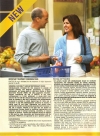Healthy Skepticism AdWatch (USA)
AdWatch illuminates the logical, psychological and pharmacological techniques used in drug advertisements.

April 2010
Wyeth’s Pristiq® (desvenlafaxine) for major depressive disorder
This advertisement misleadingly promotes a serotonin and noradrenalin reuptake inhibitor (SNRI) antidepressant on the basis of not needing titration. The antidepressant is a metabolite of an established SNRI, which is approaching the end of its patent life in several countries. No evidence is provided of its effectiveness and safety relative to the established drug.

October 2009
Amylin and Eli Lilly’s Byetta® (exenatide injection) for type 2 diabetes
This advertisement is promoting a drug for type 2 diabetes on the basis of a surrogate outcome assessed in unpublished trials, and as an off-label treatment for overweight and obesity.


